ARTICLE AD BOX
4 hours ago
By Noor Nanji, Culture reporter at Glastonbury, @NoorNanji • Mugabi Turya, BBC Audio Documentaries

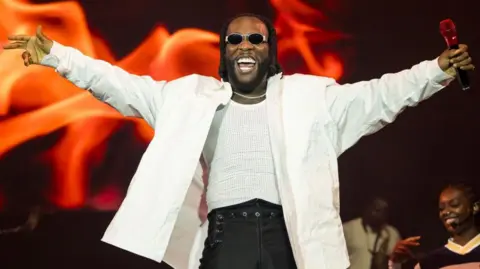 Getty Images
Getty Images
Grammy award-winning artist Burna Boy is playing at Glastonbury
On Sunday evening, Afrobeats megastar Burna Boy will fire up Glastonbury's Pyramid Stage.
While he has played at the UK's biggest festival before, this is his first time on the famous main stage, which has been Glastonbury's focal point for decades.
Fellow Afrobeats star Ayra Starr also performed on the Pyramid Stage on Saturday, while Tems had a slot on the Other Stage.
From West Africa to the world stage, Afrobeats has risen rapidly to dominate playlists and radio.
On Spotify, the Afrobeats genre has grown by 1,200% since 2017.
But with its artists now performing at the very top of the UK's biggest festival, it feels like another threshold has been crossed.
"It's our time," Starr told BBC News. "It’s been a long time coming and we deserve this."
So what is Afrobeats all about, and how has it taken off?
West African origins

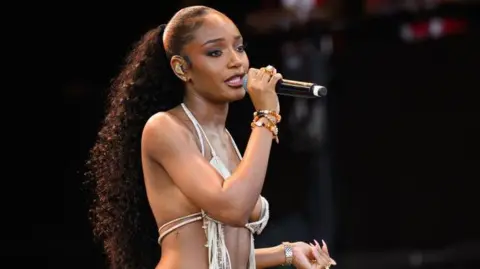 Getty Images
Getty Images
Ayra Starr took to Pyramid Stage on Saturday
The genre has its roots in Nigeria and Ghana, and started rising rapidly in popularity in the 2010s, with early hits from artists like Fuse ODG and D'banj.
It is not to be confused with "Afrobeat" - minus the "s". That is a movement created in the 1960s and 1970s by the artist and activist Fela Kuti.
Kuti's musical style is a fusion of traditional African rhythms with funk, jazz and highlife.
Coincidentally, Kuti himself played at Glastonbury in 1984, and this year, his son Femi Kuti played on the Pyramid Stage.
But Afrobeats, with an "s", is a completely different sound. It is generally seen as a fusion of traditional West African musical styles with Western pop, rap and dancehall.
"Afrobeat spoke to a much older audience," said DJ Edu, who hosts BBC 1Xtra's AfroSounds show.
"Afrobeats has been driven a lot by social media," he said, adding that young people, travelling to different parts of the world, also helped spread the sound.

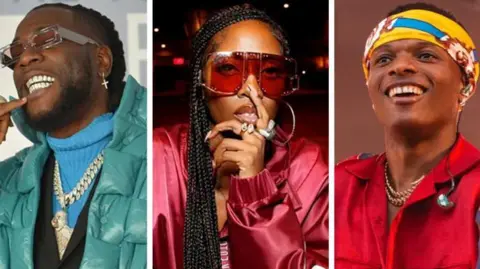 Getty Images
Getty Images
Burna Boy, Tiwa Savage and Wizkid are among the genre's superstars
There were challenges, of course. DJ Edu said that a lot of people who started out making Afrobeats were not clued up about the music industry.
"They were just kids making music from their bedrooms, not worrying about streaming or royalties. That was the big problem, there was no structure," he said.
But as bigger artists started making headway, younger ones were able to learn from them and chart their own route in the industry, he added.
DJs in the UK started fusing pop music with Nigerian and Ghanaian beats, taking the sounds to new audiences.
Songs from the genre regularly started crossing into the mainstream, with its first big global success being the release of Oliver Twist by the artist D'banj in 2012.
The song made the top 10 on the official UK Singles Chart and was number two in the UK R&B Charts.
It is often described as the first time Afrobeats really took hold in the UK.
Rise in popularity
From then on, Afrobeats quickly spread around the world. It has often been described as one of Africa's biggest cultural exports.
"We've been waiting for the globalisation of Afrobeats, and it's happening now," Starr said, speaking ahead of her Glastonbury performance.
"But it’s not just what you're seeing today. It's years and generations of musicians and hard work that’s made it what it is now."
TikTok and YouTube - where many people discover new music - have played a big part in taking Afrobeats to new audiences in the UK, the US and beyond.
One example is Nigerian artist CKay's Love Nwantiti, which went viral on the app and became the most Shazam-ed song in the world in 2021.
- Rema, the Afrobeats star who does not intend to calm down
- Burna Boy is still 'a work in progress', his mother says
- Afrobeat is now part of pop music, says Grammy CEO
Songs by singers Davido, Burna Boy and Wizkid have also gained popularity through their TikTok dance routines.
Collaborations with the likes of Beyoncé, Drake and Justin Bieber have also helped lift the Afrobeats scene to new heights.
For example, Drake featured Wizkid on 2016's One Dance - which helped put a spotlight on the singer and the genre he represents.
In the summer of 2023, Burna Boy made history when he became the first African artist to headline a stadium show in the UK in front of a sold-out crowd of 60,000 at the London Stadium.

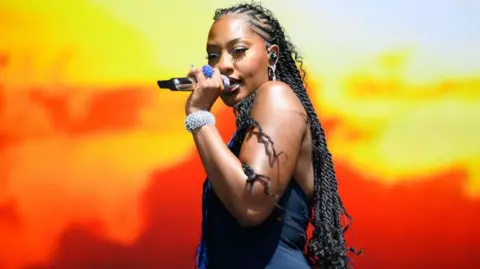 Getty Images
Getty Images
Tems played on The Other Stage at Glastonbury this year
"The genre's rise has been nothing short of meteoric," Sheniece Charway, YouTube's artists' relations manager for black music and culture, told BBC News.
"Afrobeats has ignited a global revolution, and it's captivating trajectory shows no sign of slowing."
"Popular music is pop music and Afrobeats has become popular music globally," she added.
"We are seeing the likes of Wizkid, Libianca and Burna Boy all having global success, which shows that their audience is everywhere."
In a sign of the genre's huge global popularity, it has been included as a category in a number of major awards.
Billboard in the US recently added an Afrobeats category, with Burna Boy and fellow Nigerian star Rema both recognised at the event in November.
Burna Boy, who has also been the recipient of a Grammy, dedicated his award "to Africa and every artist coming out of Africa now".

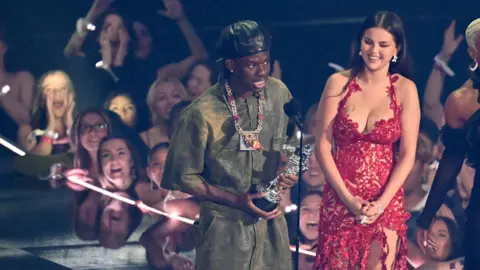 Reuters
Reuters
Rema and Selena Gomez won the Best Afrobeats award for Calm Down at last year's MTV Video Music Awards
Meanwhile Rema won a gong for his near-ubiquitous song Calm Down, which has smashed multiple streaming and chart records.
The track, which featured Selena Gomez, became the first African artist-led track to hit a billion streams on Spotify.
Accepting the Billboard award for best Afrobeats song, Rema thanked his fans and called the prize "a celebration of unity and the global domination of Afrobeats".
The MTV VMAs, Grammys and American Music Awards have also recently added the category of best Afrobeats.
DJ Edu says this recognition has meant a lot to Afrobeats artists.
"[It] shows there's a light at the end of the tunnel for this music," he said.
People are 'infatuated'
For Starr, part of the reason for Afrobeats' huge growth is the fact the sound is overwhelmingly positive.
"Afrobeats is enjoyment. You have to enjoy yourself, you have to be at a club or at a party to make the music that people want to dance to. And we like to dance," she said.
"I feel like that's why it's our time. I think God has made it like that - because we make positive music, we make high vibrational music."
Meanwhile in the UK, British artists have been developing their own style and sound, such as Afroswing, which merges Afrobeats with dancehall, grime, rap and R&B.
Grammy award winning producer Jae5, based in the UK, has produced mega-hits for Burna Boy and Dave.
"The main influence that I'm infusing things with is the African culture," he told BBC News.
"I'll make a hip hop song and it will still have a lot of percussive elements. I might make a ballad and I'll have more percussive elements than a normal track. So the African sound is what is continuous in my music. The groove of Africa is very different to the groove over here."
Having swept the globe and landed at Glastonbury, what's next for Afrobeats?
Jae5 can see it going from strength to strength, as people are "infatuated" by the sound.
"The world is huge and Afrobeats has so much space to grow," he said. "And the fact that [fans] are receiving it in the way they are is amazing."
For more on the rise of Afrobeats, listen back to Black, African and British on BBC Radio 4.
Additional reporting by Mark Savage.



 6 months ago
45
6 months ago
45
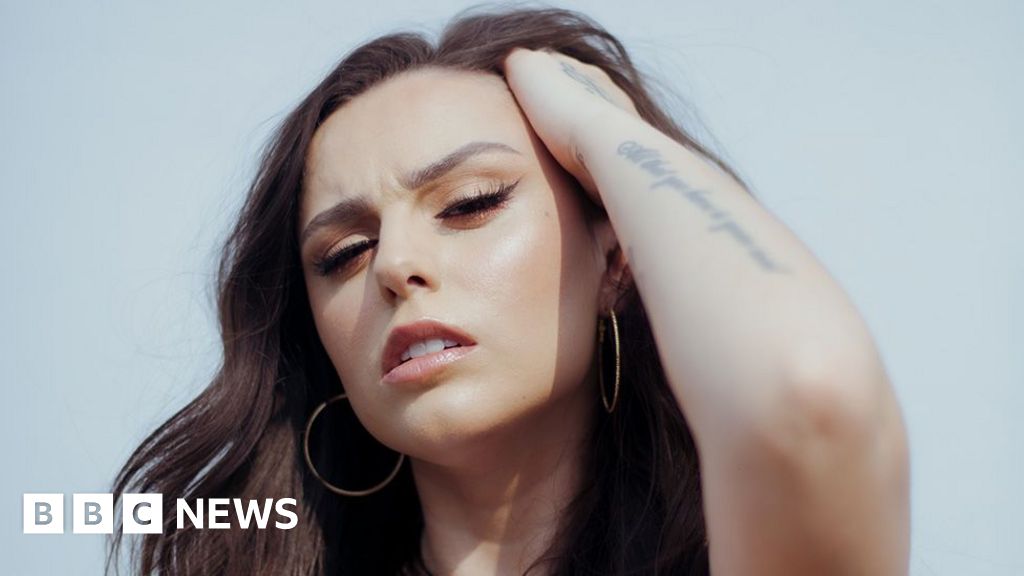
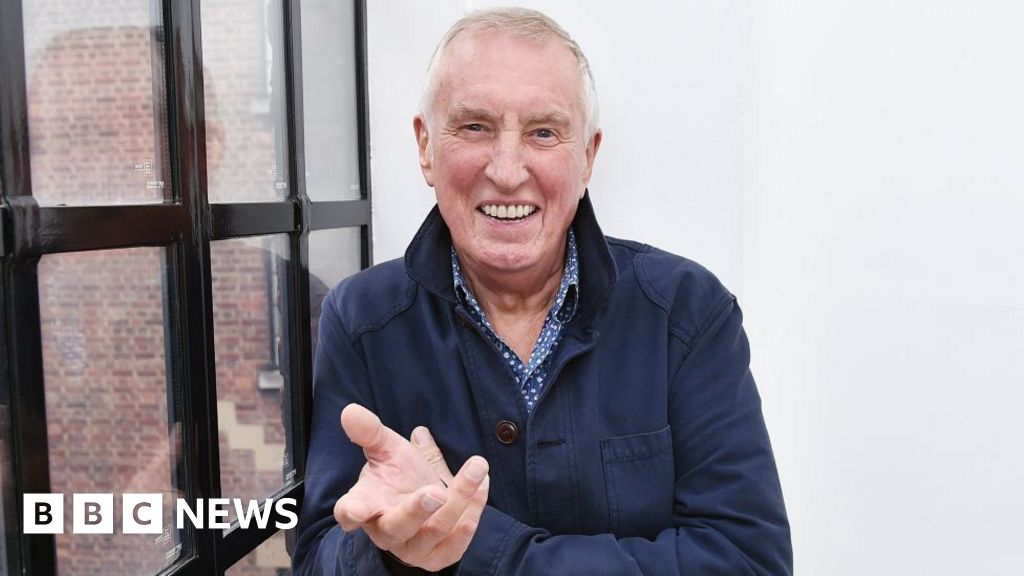
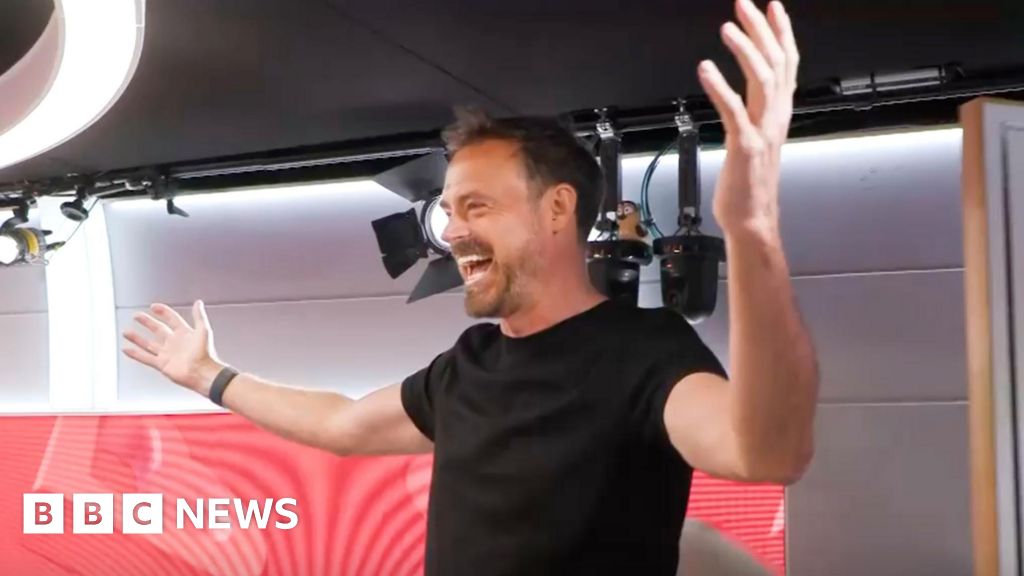





 English (US) ·
English (US) ·